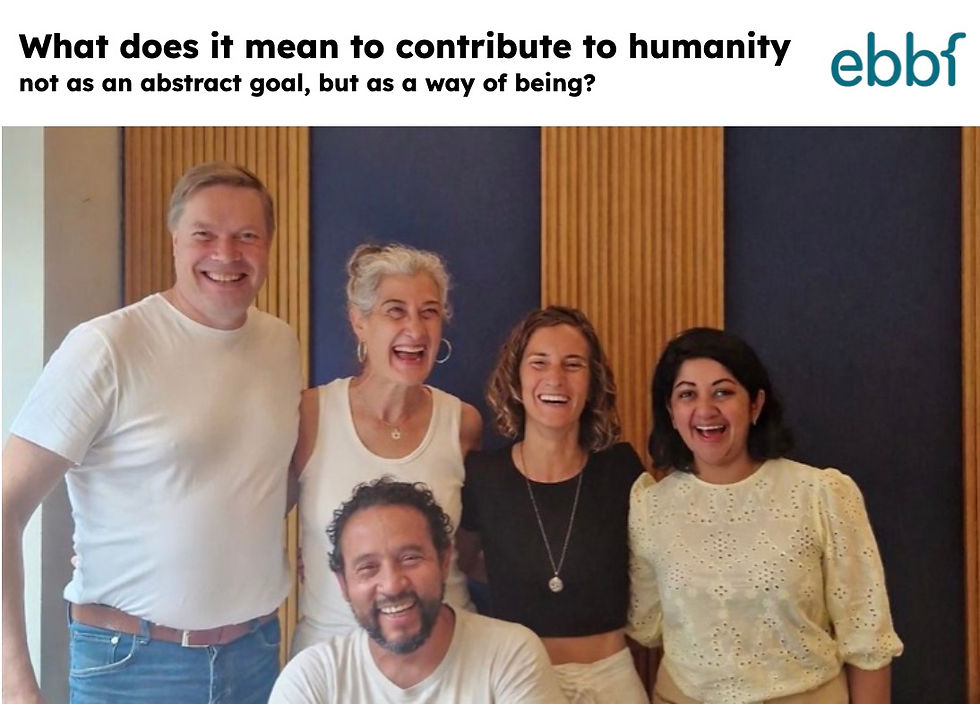#ebbfgovernance participants offer “Reflections on future global governance systems”
- sjoerdluteyn
- May 13, 2018
- 4 min read
Prior to attending
ebbf’s 28th international annual event dedicated to rethinking governance to allow ethical business to build the future, event participant Pascal Schmidt co-wrote with colleagues Nicola Benigni and Marco Felici this insightful article:
“As we were participating in the Global Challenges Prize, a call for ideas on global governance systems that would help to address our world´s border-transcending challenges, we asked ourselves the question of how to create a system that has (and is conducive to) unity and justice at its core and at every level. How do we ensure that the views of the diverse people of the world are brought into the decision process while still reaching consensus? How do we guarantee democratic legitimation in an ever-evolving system and a continuous flow of learning bottom-up and top-down? Do we want the purest of heart or the most knowledgeable to make decisions and can we induce through an election mechanism that well-wishers of all are elected? How can we make sure that the latest learning from science and religion are embedded into policy? How different would our societal structure be if women would be equally represented among the elected?
Past unities have been defined by dissociating from others due to differences in ethnicity, social class, gender or opinion, but how could an all-encompassing unity look like? Instead of searching for “enemies” in the above-mentioned spheres, the common enemies we face as one interconnected human race are becoming more and more defined: climate change, depletion of fundamental resources, nuclear war to name but few. A conscious unified shared identity that encompasses diversity we deem essential for a system in which the collective good prevails over private interests and provincialism. This common identity would ensure that every citizen fully and transparently engages with it, and the individuals in positions of power, acting as representatives of the whole world population, serve with the utmost respect and dedication the cause of a prosperous and fair global community. We are convinced that working to achieve global coordination and collaboration yields the biggest possible benefit to present to future generations. Knowing that the below ideas are only first reflections and that the individual, the society and its institutions are fundamentally linked and the development of either is dependent on the other, we would still like to welcome you to a thought experiment: picture a common yet culturally diverse institutional system with the four pillars of a world parliament, a world government, a world judiciary and a world center for science and religion.
Imagine a world parliament elected in stages. Initially, each local community would select a voting individual who would represent it throughout the process. This is to foster connection to the grassroots. At subsequent stages and at higher levels of geographical aggregation, the voting individuals would select among themselves those who should proceed to the next stage, because more fit to serve as representatives of the whole world. Notice that voting individuals could never cast a vote for themselves, nor for voting individuals from their most immediate geographical surroundings. Finally, the last vote would not occur in clusters dictated by geographical proximity, but by a randomness criterion. These measures are meant to prevent regional coalitions to emerge, so that voting individuals would choose those best fit to serve the entirety of humanity. Since diversity is key to the proper functioning of the governance system, at each stage half the selected candidates would be women and half men, so that this would also be the final proportion in the world parliament. The parliament would be responsible to draft an initial program for what the mandate of the government should be, and to legislate the details over the course of the parliamentary term.
Imagine then a world government elected by the parliament among its members. The members of parliament would not be able to vote for themselves, nor vote for specific roles in the government. The government would be composed of an even number of ministries, half of which women and half men, with the role of prime minister rotating among them every six months. The world government would move along two distinct lines: that of decisions which are binding for all member states (such as environmental regulation), and that of decisions promoting the harmonization of existing institutional structures across countries (such as national pension schemes). Since the governance system would be based on the principle of subsidiarity, this of harmonization would be a longer-term objective, and it would not be binding for the member states. Finally, the world government takes decisions by consultative decision making: by consensus, and if need be by qualified majority.
Imagine a world judiciary that combines on one hand local and national tribunals in charge of national issues, and on the other hand continental and global tribunals for disputes between countries. While the specific organization of local and national tribunals are left to the member states, the final objective would be that of an alignment of the different legal systems across countries, so to eventually obtain unified and universal legal standards. The global tribunal would have the right to overrule continental tribunals and serve as the ultimate legal authority, with a binding effect on all matters of global pertinence. Continental tribunals and the global tribunal would be totally independent from the other branches of the governance system, as their members would not be elected by the world parliament, but among candidates proposed by each country. The power of the judiciary would be kept in check by an ad hoc review commission, which could be requested by the parliament, to assess an alleged abuse of power by the judiciary.
Imagine, eventually, a world center for science and religion: an advisory committee complementary to the other three pillars. It would be composed of leading experts in the fields of the natural and social sciences, as well as representatives from all world religions. It would be responsible for supporting and guiding through advice the legislative, executive and judiciary work of the governance framework. It would be a bridge between academia, politics and the different moral sensibilities that pervade society. As an external observer, it would also be in charge of addressing weak points of existing policies and processes, to ensure that the world governance system in place is the most suitable to react quickly and appropriately to foreseen, and especially unforeseen, challenges. “
Nicola Benigni, Marco Felici, Pascal Schmidt







Comments